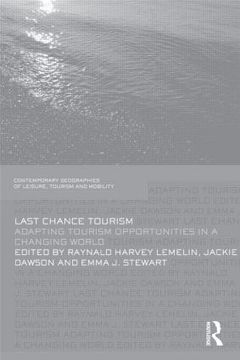Last Chance Tourism Adapting Tourism Opportunities in a Changing World Contemporary Geographies of Leisure, Tourism and Mobility Series
Coordonnateurs : Lemelin Harvey, Dawson Jackie, Stewart Emma J.

Concerns over vanishing destinations such as the Great Barrier Reef, Antarctica, and the ice cap on Mt. Kilimanjaro have prompted some travel operators and tour agencies to recommend these destinations to consumers before they disappear. This travel trend has been reported as: ?disappearing tourism,? ?doom tourism,? and most commonly ?last chance tourism? where tourists explicitly seek vanishing landscapes or seascapes, and/or disappearing natural and/or social heritage. However, despite this increasing form of travel there has been little examination in the academic literature of last chance tourism phenomenon.
This is the first book to empirically examine and evaluate this contemporary tourism development providing a new angle on the effects of global change and pressures of visitation on tourism destinations. It aims to develop the conceptual definition of last chance tourism, examine the ethics surrounding this type of travel, and provide case studies highlighting this form of tourism in different regions, and in different contexts. In particular it critically reviews the advantages of publicizing vulnerable destinations to raise awareness and promote conservation efforts. Conversely, the book draws attention to the issue of attracting more tourists seeking to undergo such experiences before they are gone forever, accelerating the negative impacts. It further examines current trends, discusses escalating challenges, provides management strategies, and highlights future research opportunities.
Last Chance Tourism is a timely and multi-disciplinary volume featuring contributions from leading scholars in the fields of leisure, tourism, anthropology, geography, and sociology. It draws on a range of international case studies and will be of interest to students, researchers and academics interested in Tourism, Environmental Studies and Development Studies.
Section 1: Disappearing Landscapes/Seascapes and Vanishing Fauna 1. An Introduction to Last Chance Tourism2. Firsts and Lasts in Arctic Tourism: Last Chance Tourism and the Dialectic of Change 3. Last Chance tourism in Antarctica – Cruising for change? 4. Last Chance Tourism in Alpine Regions: Last Chance to Ski?5. Vanishing Fauna of Tourism Interent6. Last Chance Birding: Twitching to See it First or Last? 7. The Transformation of Polar Bear Viewing in the Hudson Bay Region, CanadaSection 2: Media and Marketing 8. Last Chance Tourism? Public Sector Views of Marketing Endangered Tourism Destinations in North America 9. Advertising World Heritage Sites: Tour Operators and Last Chance Destinations10. Last Chance Tourism on the Great Barrier ReefSection 3: Ethics, Culture and Management 11. Après Moi Le Deluge: Ethics, Empire, and the Biopolitics of Last Chance Tourism12. Bringing the Gaze to the Masses. Taking the Gaze to the People: The Socio-Cultural Dimensions of Last Chance Tourism 13. Seeing it Off: Last-Chance Tourism Opportunity Shagged by Rare Parrot! 14. Last Chance Tourism in Canada’s Protected Areas: Management Implications and Emerging Ethical Considerations15. Last Chance Tourism: Conclusion
Raynald Harvey Lemelin is the LU-SSHRC Research Chair in Parks and Protected Areas at Lakehead University, Ontario, Canada. His research interests include northern parks and wildlife management. Dr. Lemelin and colleagues recently published the first article of Cree knowledge of polar bears in Canada.
Jackie Dawson is a Canada Research Chair in Environment, Society and Policy at the University of Ottawa where she is affiliated with the Department of Geography and the Institute for Science Society and Policy. Her research focus is on the human dimensions of global change including transforming Arctic economies.
Emma J. Stewart’s interests include polar tourism, cruise tourism, climate change and participatory research methodologies. Emma is a Senior Lecturer in tourism and parks at Lincoln University, New Zealand and is a Research Associate at the Arctic Institute of North America (AINA). She has published two edited texts on polar tourism.
Date de parution : 11-2011
15.6x23.4 cm
Date de parution : 05-2017
15.6x23.4 cm
Thèmes de Last Chance Tourism :
Mots-clés :
Last chance tourism; climate change; global warming; raynald harvey lemelin; emma stewart; jackie dawson; adapting; adaptation; glaciers; doom tourism; disappearing tourism; tourism ethics; tourism conservation; contemporary geographies of leisure tourism and mobility; Chance Tourism; Churchill Wildlife Management Area; Wapusk National Park; HMS Investigator; Changing Sea Ice Conditions; Ontario Provincial Parks; Dronning Maud Land; Erythrura Gouldiae; European Honey Buzzard; Mountain Gorilla; Wildlife Tourism Interactions; Polar Bear Viewing; Glacier Surface Area; Beechey Island; Ecological Sovereignty; Protected Areas; Yangtze River Dolphin; Wild River; Ski Areas; Rare Birds; Antarctic Tourism; Wildlife Tourism; Hudson Bay Region; Great Barrier Reef; GBR's Tourism



